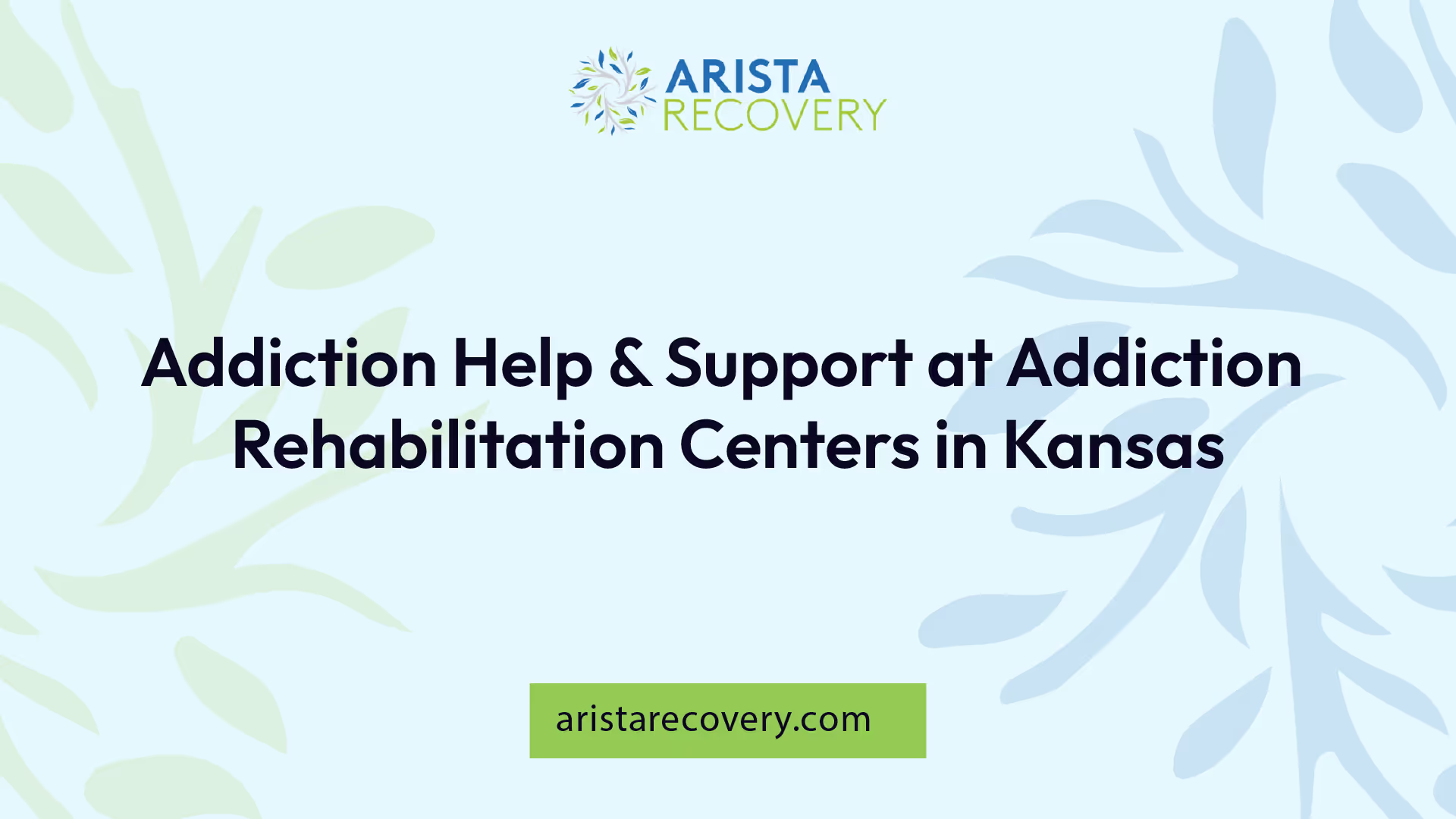Addiction Help & Support at Addiction Rehabilitation Centers in Kansas


Understanding Addiction and Recovery
Overview of Addiction
Addiction is characterized as a complex condition that often leads to compulsive substance use despite harmful consequences. It is recognized as a chronic disease, affecting both physical and psychological health. The reality of addiction is underscored by alarming statistics; in 2022, nearly 108,000 people in the United States died from drug-involved overdoses, highlighting the severity of addiction-related issues.
Addiction can affect anyone, regardless of age, gender, or socioeconomic background. It often develops from a combination of genetic, environmental, and social factors. Understanding the context and nature of addiction is vital, as it enables individuals and their loved ones to seek appropriate help, particularly through rehabilitation centers that provide targeted treatment options.
The Road to Recovery
Recovery from addiction is a challenging journey, marked by various stages from initial treatment to long-term sobriety. Relapse rates for both drug and alcohol use range between 40-60%, indicating that many individuals may struggle before achieving sustained recovery.
A successful recovery process involves several crucial elements:
In recognizing the complexities of addiction and the multifaceted approach necessary for recovery, those seeking addiction help at rehabilitation centers in Kansas are more likely to find resources tailored to their needs.
Addiction Statistics and Challenges
Impact of Addiction
Addiction is a significant public health issue, influencing not only individuals but also families and communities. In 2022, nearly 108,000 people died in the United States from drug-involved overdoses, demonstrating the severity of addiction-related challenges. The repercussions of addiction extend beyond health, impacting social relationships, employment, and overall quality of life.
YearDrug-Involved Overdose Deaths2022108,000
Relapse Rates and Success Factors
Relapse is a common aspect of addiction recovery, with relapse rates for drug and alcohol use estimated to be between 40-60%. Addiction is recognized as a chronic condition, and for some individuals, multiple relapses may occur throughout their treatment journey. Successful outcomes in addiction rehabilitation often hinge on several factors, including personalized treatment, continuous evaluations, and the incorporation of evidence-based therapies by health professionals.
The challenge becomes evident when considering treatment adherence. Less than 43% of those entering treatment for drug and alcohol use complete the recommended program, highlighting significant barriers to achieving satisfactory recovery outcomes [3].
MeasurePercentageEstimated Relapse Rate40-60%Treatment Completion Rate< 43%
It is crucial to note that successful treatment incorporates tailored care, ongoing evaluation, and integration with aftercare programs. Research indicates that individuals who complete comprehensive treatment, coupled with continued care, see a reduction in drug use and criminal activity, resulting in healthier lifestyle changes [3].
The effectiveness of aftercare programs remains challenging to measure, given the chronic nature of addiction and the potential for relapse. Effective treatment is essential in alleviating symptoms, while inadequate treatment can contribute to symptom recurrence and increased likelihood of relapse.
Importance of Aftercare Programs
Aftercare programs play a crucial role in the recovery process for individuals who have completed addiction rehabilitation. These programs provide ongoing support and resources to help maintain sobriety and address challenges that may arise post-treatment. Understanding the components of effective aftercare and the challenges in measuring its success is essential for those seeking addiction help at rehabilitation centers in Kansas.
Aftercare Components
Successful aftercare programs for addiction consist of four key components that contribute to sustained recovery. These components are vital for supporting individuals after they have completed their initial rehabilitation programs (Rehabs.com):
ComponentDescriptionEmotional SupportAccess to counseling and support groups to share experiences and coping strategies.Relapse PreventionEducation on triggers and strategies to cope with cravings and avoid relapse situations.Life Skills TrainingWorkshops on skills such as stress management, communication, and problem-solving.Continuing CareRegular check-ins and follow-up appointments with healthcare providers to monitor progress.
These components collectively work to reinforce the lessons learned during rehabilitation, equipping individuals with the tools needed for a successful transition back into daily life.
Challenges in Aftercare Measurement
The effectiveness of addiction aftercare programs can be challenging to quantify due to the chronic nature of addiction. Relapse is common and can occur even after extensive treatment, making accurate measurement of program success complex. Several factors contribute to these challenges:
ChallengeDescriptionChronic RelapseMany individuals experience multiple relapses, complicating efforts to assess long-term success.Individual VariabilityEach person's journey in recovery is unique, making standardization of outcomes difficult.Lack of Follow-Up DataInconsistent tracking of participants after they leave the program can result in gaps in understanding effectiveness.
Effective treatment plays a significant role in reducing symptoms and the likelihood of relapse, while poor or absent treatment often exacerbates issues. Understanding these challenges is crucial for improving aftercare support systems and ensuring individuals receive the help they need to maintain their recovery journey.
Tailored Care in Addiction Treatment
Addressing addiction requires a multifaceted approach that is individualized to suit the specific needs of each person seeking help. Tailored care has shown to significantly enhance successful outcomes in addiction rehabilitation.
Individualized Treatment Plans
An individualized treatment plan is essential in addiction recovery. It takes into account the unique circumstances, preferences, and challenges faced by each individual. Such plans often consider factors like the type of substance used, the severity of addiction, medical history, and personal goals for recovery. This personalized approach ensures that treatment is engaging and effective.
Studies indicate that less than 43% of individuals who enter treatment for drug and alcohol use ultimately complete the recommended program [3]. This statistic underscores the necessity of tailoring care to enhance motivation and commitment to the recovery process.
The table below outlines key elements typically included in individualized treatment plans:
Treatment ElementDescriptionAssessmentComprehensive evaluation of the individual’s needs, substance use history, and mental health status.Custom GoalsSetting specific, achievable recovery goals to guide the treatment process.Treatment ModalitiesA combination of therapies, such as cognitive-behavioral therapy (CBT), motivational interviewing, and group therapy, tailored to the individual.Continual EvaluationRegular adjustments to the treatment plan based on progress and evolving needs.
Tailored treatment plans also emphasize the importance of continual evaluation and follow-up with aftercare programs. These components work together to increase the likelihood of successful recovery.
Addressing Co-Occurring Conditions
Co-occurring conditions, such as mental health disorders alongside substance use disorders, are common amongst individuals seeking addiction help. Effective addiction care must simultaneously address these issues to foster a holistic recovery environment. Research suggests that comprehensive treatment, including follow-up care, can lead to better outcomes by reducing drug use and related criminal activity [3].
Addiction aftercare programs play a crucial role in this context. Their goals include providing ongoing support and assistance to individuals who have completed rehab programs. However, measuring the effectiveness of these programs can be challenging due to the chronic nature of addiction and the potential for relapse.
The table below highlights critical aspects of effective aftercare services for individuals with co-occurring conditions:
Aftercare ComponentPurposeContinued TherapyRegular sessions to address both substance use and mental health issues.Support GroupsPeer support to share experiences and challenges, helping to prevent isolation.Life Skills TrainingCoaching in coping strategies, stress management, and daily living skills.Comprehensive ServicesAddressing physical health, housing stability, and financial resources to enhance overall well-being.
Emphasizing tailored care that incorporates both addiction recovery and mental health treatment can significantly lower stress levels and decrease the likelihood of relapse. Comprehensive services help individuals navigate the complexities of recovery while fostering hope and resilience in their journey towards a healthier life [4].
Levels of Addiction Treatment in Kansas
Understanding the different levels of addiction treatment available in Kansas is crucial for individuals seeking assistance. The range of treatment options allows for personalized care based on each person's unique circumstances and needs.
Available Treatment Options
In Kansas, various levels of addiction treatment are available, including:
Treatment TypeDescriptionMedical DetoxificationA program focused on managing withdrawal symptoms and medically stabilizing individuals before further treatment. Addicted.org KansasInpatient/Residential TreatmentA structured program where individuals live at the facility and receive intensive support and therapy.Outpatient TreatmentPrograms that allow individuals to continue their daily activities while attending therapy and counseling sessions.Sober Living HomesTransitional housing that provides support for individuals in early recovery while they adjust to sober living.
These treatment options work together to address various aspects of addiction, from medical stabilization to long-term recovery support.
Determining Suitable Care Levels
The appropriate level of care for an individual is determined based on personal needs and the severity of addiction. The American Society of Addiction Medicine (ASAM) criteria are utilized in Kansas to assess these factors. Each treatment plan is tailored according to these criteria, ensuring a customized approach to care that considers both addiction and any co-occurring conditions [5].
It's essential for individuals seeking addiction help at rehabilitation centers in Kansas to undergo a comprehensive assessment to identify the most suitable treatment pathway. Recognizing the importance of personalized care can greatly improve the chances of successful recovery and long-term sobriety.
Notable Rehabilitation Centers in Kansas
When seeking addiction support, various rehabilitation centers in Kansas offer unique services tailored to individual needs. Here are three notable centers:
Valley Hope of Moundridge
Valley Hope of Moundridge is known for its comprehensive approach to treatment. It has received a 4.3-star rating on Google and holds membership in the National Association of Addiction Treatment Providers (NAATP). This center provides services for a range of issues, including:
Treatment ServicesBehavioral health conditionsSubstance use disorderMental health disorderBehavioral addictions
This diverse array of services allows clients to receive holistic care tailored to their specific situations.
Holland Pathways
Holland Pathways boasts a strong reputation, achieving a 4.4-star rating on Google with over 80 reviews. This center also specializes in a variety of treatment options, catering to:
Treatment ServicesBehavioral health conditionsSubstance use disorderMental health disorderBehavioral addictions
Their experienced staff works closely with clients to create individualized treatment plans.
EDCare Kansas City
EDCare Kansas City has gained positive client testimonials, reflecting its effective treatment approach. It provides services for a wide range of issues similar to the other centers, including:
Treatment ServicesBehavioral health conditionsSubstance use disorderMental health disorderBehavioral addictions
This center is committed to offering thorough support for those struggling with addiction and related conditions.
These centers exemplify the breadth of options available for individuals seeking addiction help at rehabilitation centers in Kansas. Each facility brings its own strengths and focus areas, ensuring that clients can find the support they need to begin their recovery journey.
References
[2]:
[3]:
[4]:
[5]:
[6]:
You’re not alone in this.
When mental health challenges and addiction intersect, it can feel isolating. At Arista, we offer compassionate, evidence-based, and trauma-informed care to help you heal, grow, and move forward.
You’re not alone in this.
When mental health challenges and addiction intersect, it can feel isolating. At Arista, we offer compassionate, evidence-based, and trauma-informed care to help you heal, grow, and move forward.
Support that moves with you.
You’ve taken a brave first step. At Arista Recovery, we’re here to help you continue with best-in-class care designed for long-term healing and support.
.webp)






